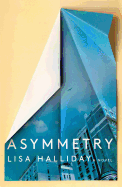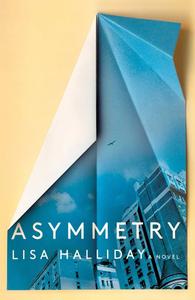
 From the get-go, Whiting Award-winner Lisa Halliday signals that the world of her first novel, Asymmetry, will be more like that found behind Lewis Carroll's looking glass than the more prosaic one in front of it. Young editor Alice Dodge is sitting on a New York City park bench trying to read a dense book of "long paragraphs, and no quotation marks whatsoever" and (echoing Carroll's Alice) wondering "what is the point of a book... that does not have any quotation marks?"
From the get-go, Whiting Award-winner Lisa Halliday signals that the world of her first novel, Asymmetry, will be more like that found behind Lewis Carroll's looking glass than the more prosaic one in front of it. Young editor Alice Dodge is sitting on a New York City park bench trying to read a dense book of "long paragraphs, and no quotation marks whatsoever" and (echoing Carroll's Alice) wondering "what is the point of a book... that does not have any quotation marks?"
When a famous novelist 50 years her senior sits beside her, she is drawn by his fame and conversational flair. The two discover a mutual fascination with old movies, books, music and the Yankees-Red Sox rivalry, and subsequently fall into a love affair. Asymmetry takes off into the quotation mark-filled banter of two literary sorts navigating the shifting terrain of geriatric sex positions and unscheduled trips to hospitals and pharmacies.
Then, as if slipping through that looking glass, the novel shifts to the story of Amar Jaafari, the son of California immigrants from Iraq. He is trapped in customs detention at Heathrow trying to prove he is neither a threat nor a deadbeat. In question mark-free long paragraphs recounting an ambivalent relationship with his family, faith and Iraqi origins, his story dips into the miasma of Iraq's post-Saddam politics and upheaval. Over several trips to visit extended family in Baghdad, he leans toward the opinion that "maybe East and West really are eternally irreconcilable--like a curve and its asymptote, geometrically fated never to intersect." In their asymmetrical divergence, Halliday's two tales straddle our off-plumb world in the first decade of the 21st century.
Halliday includes excerpts from Huck Finn, Camus and Joyce's crude pornographic letters. Her marvelous scenes of Alice and Ezra watching Big Papi long balls and Jeter double-plays have a press box play-by-play cadence. She rattles off the many instructions on Ezra's cornucopia of meds as if they were a pharmaceutical Ten Commandments.
With deadpan indifference, she runs through the inane questions of jury voir dire or those of immigration officers, the latter leaving Amar feeling like he's in a "game of Tic-Tac-Toe in which the other person gets to go first." His ruminations on the fate of Iraq dip into its long history of war, politics, religion, dislocation and migration. Sweetening the mix, Halliday has a poet's eye for metaphor--comparing, for example, a steady snowfall to "an army of parachuting invaders" or likening an array of fresh fish behind sneeze-proof glass to "newborns in a maternity ward."
Despite its very disparate pair of stories, Asymmetry adeptly concludes in a short coda interview with Ezra after he finally wins a Nobel Prize. Reflecting on his favorite music (Schubert's Im Abendrot) and book (Joyce's Ulysses), he opines on the role of literature--thoughts that could also be said of Halliday's gifted debut: "It is human nature to try to impose order and form on even the most defiantly chaotic and amorphous stuff of life.... Some of us wage war. Others write books." --Bruce Jacobs, founding partner, Watermark Books & Cafe, Wichita, Kan.
Shelf Talker: Deftly combining two stories that are distinctive in style and content, Whiting Award-winner Lisa Halliday's Asymmetry is a stellar piece of writing and a bold debut.

